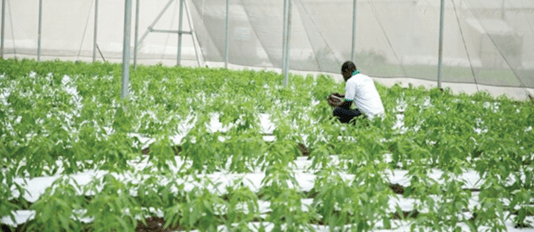By Wisdom JONNY-NUEKPE
The Ghana Incentive-Based Risk Sharing System for Agriculture Lending (GIRSAL), has partnered with agribusiness investors to enhance the production and export of chili pepper to increase foreign exchange earnings.
Known as the GIRSAL Chili Pepper Commercialisation Project, the initiative is meant to enhance the country’s chili production and export potential through protected cultivation.
As lead implementer of the project and delivering key technical know-how, GIRSAL will facilitate investor engagement, provide technical support and strengthen market linkages for producers and exporters, while facilitating certification for international markets to ensure seamless export trade for chili producers under the partnership.
GIRSA’s Chief Executive Officer, Kwasi Duah, said the project will increase chili production to meet its growing demand for exports and create jobs for young people in the value chain.
He said Ghana has a comparative advantage in terms of airfreight and distance to the EU market – and as such it is important that the country taps into the yearly estimated US$76million global chili market.
As popularity of ethnic cuisines that use chili pepper soars, there is a growing demand for the commodity.
Between 2015 and 2020, the UK’s chili imports from outside the EU grew by 50 percent. Also, the per capita consumption of fresh chili in the US grew from 8 pounds to 11 pounds by 2023 – mainly driven by exports.
As of 2015, Ghana’s annual chili export value averaged only US$5million.
However, Mr. Duah said the potential to scale up and export more to the EU and US has always been available.
According to him, sixteen agribusinesses have so far been signed onto the first phase of the initiative which will be implemented this year.
The project’s scope
Chief Operating Officer-GIRSAL Samuel Yeboah explained that the initiative’s key objective is to produce 30 hectares of chili for export in the first phase with an expected 600 metric tonnes of the commodity.
“Of this production target, GIRSAL and its partners have projected to export about US$3million of chili this year and more in the subsequent year,” he said.
Various participating agribusinesses on the initiative are expected to build their capacity after taking part in the project, using the right protocols and standards.
Mr, Yeboah said agribusinesses will have an enhanced capacity to produce chillies and leverage expertise and support from GIRSAL to scale up and privately export to the global market.
“GIRSAL has done its trial and inculcated such standards and templates as per international demands to be followed by the farmers.
Farmers who have signed on the project have basic infrastructure – land, proximity to airport, water for irrigation etc.,” he indicated.
Director for Commercial and SME Banking at Fidelity Bank, Samuel Amponsah, explained that Fidelity and other partnering banks are financing about 50 percent of total production cost.
“We see this as being the surest way of boosting non-traditional exports – funding these viable initiatives to create more jobs for agribusinesses.
The important thing is that we at the banks will be happy to support this project at commercially viable rates,” he disclosed.
Emmanuel Asimanyi, CEO-Raotelle Farms – one of the participating agribusinesses in the project, explained that the initiative will help build farmers’ capacity while they learn to produce chillies more efficiently under safe conditions and scale up.
This, according to him, aligns with government’s accelerated export development agenda.










